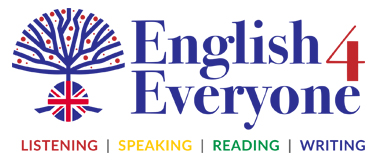Blog
7 Great ways to practise the English Language!
The very best way for guaranteed success when practising the English Language is to immerse yourself in the language.
Using any language is a two-way street, being both an input and output process. Language input has to do with listening and reading, whilst output involves us in speaking and writing.
The following are 7 ways for you to practise the English Language:

1. Read a Book
Initially you must find a book written at your level of English. You may have to start with a children’s book in order to tackle basic written English, especially if you are only just beginning to learn English.
You can try reading the book aloud with a trusted friend, as this will help to improve your speaking and comprehension skills.
2. Write a Story
Draw upon your imagination and personal experiences to create a simple story (based on either factual or fictional events).
Write down anything that comes into your mind as simple sentences using basic grammar and punctuation. As you do this, think about drawing upon different vocabulary as you write.
Correct use of new words within sentences in this way will help you to remember such words in the future. After writing and editing your story, you can read it aloud to practise your speaking skills.


3. Record yourself whilst Speaking
This may seem a strange thing to do, but improvement of your English will occur as you replay the recording several times and try to correct any mistakes made until you feel more satisfied with the final result.
You can also make a recording and send it to a friend, ideally a native English speaker who will help you to correct any mistakes.
4. Practise Tongue Twisters
By listening to and then practising certain tongue twisters, you will start to pronounce different letters and consonant sounds more clearly.
Including tongue twisters in oral practice will help you to quickly improve your spoken English. You can start with easy tongue twisters, and then move on to practising harder ones.
‘She sells seashells by the seashore’ is an example of a simple tongue twister.


5. Sing songs in English
There are many famous songs written in English, and you can listen to these songs on the radio, a mobile phone, or by using the Internet on your home computer.
Try to sing along and learn a song as you read and carefully listen to how a performer pronounces the lyrics. This is an easy and fun activity to do at home in order to help you learn English.
6. Use Apps to help you speak English
There are many Apps now available on IOS, Android, and PC devices that will help you to practise and improve your English.
Some Apps are free to download, whilst others require a payment in order to use them. If you can afford to pay for Apps, these are generally more effective in giving you valuable online opportunities to practise your English skills.
Duolingo is an example of a free App you can use when trying to learn English. Another free App is Busuu, but it has a premium version as well.
Practise with any one of these Apps, for at least 10 to 15 minutes every day, will improve fluency and build greater confidence when expressing yourself using English.


7. Think in English
As you do regular daily chores and activities, try to think in English. Learn English vocabulary for items that you use every day.
Make a note of words in your native language along with the English words, and then see how many English words you can remember each day.
You should also practise the correct pronunciation of newly memorised English words by speaking them aloud.
This will help to continually improve your English speaking skills through gaining clearer and more confident self-expression.
In a Nutshell:
It is essential that you practise English every day through listening, speaking, reading and writing. By dedicating 30 minutes of your time to such practise every day, you will see significant improvements in all of your English skills.
In your daily practice you can learn new English vocabulary, and then use these words whilst communicating during any activities.
But always remember, there is no shortcut if you want to become a fluent and effective international communicator by learning English. Constant practice, under the essential guidance of a private English tutor, is the key to guarantee your success.
If you want to find out more about English courses and having English tuition in Johor Bahru with a very experienced native-speaking English tutor, please get in touch with us immediately.
